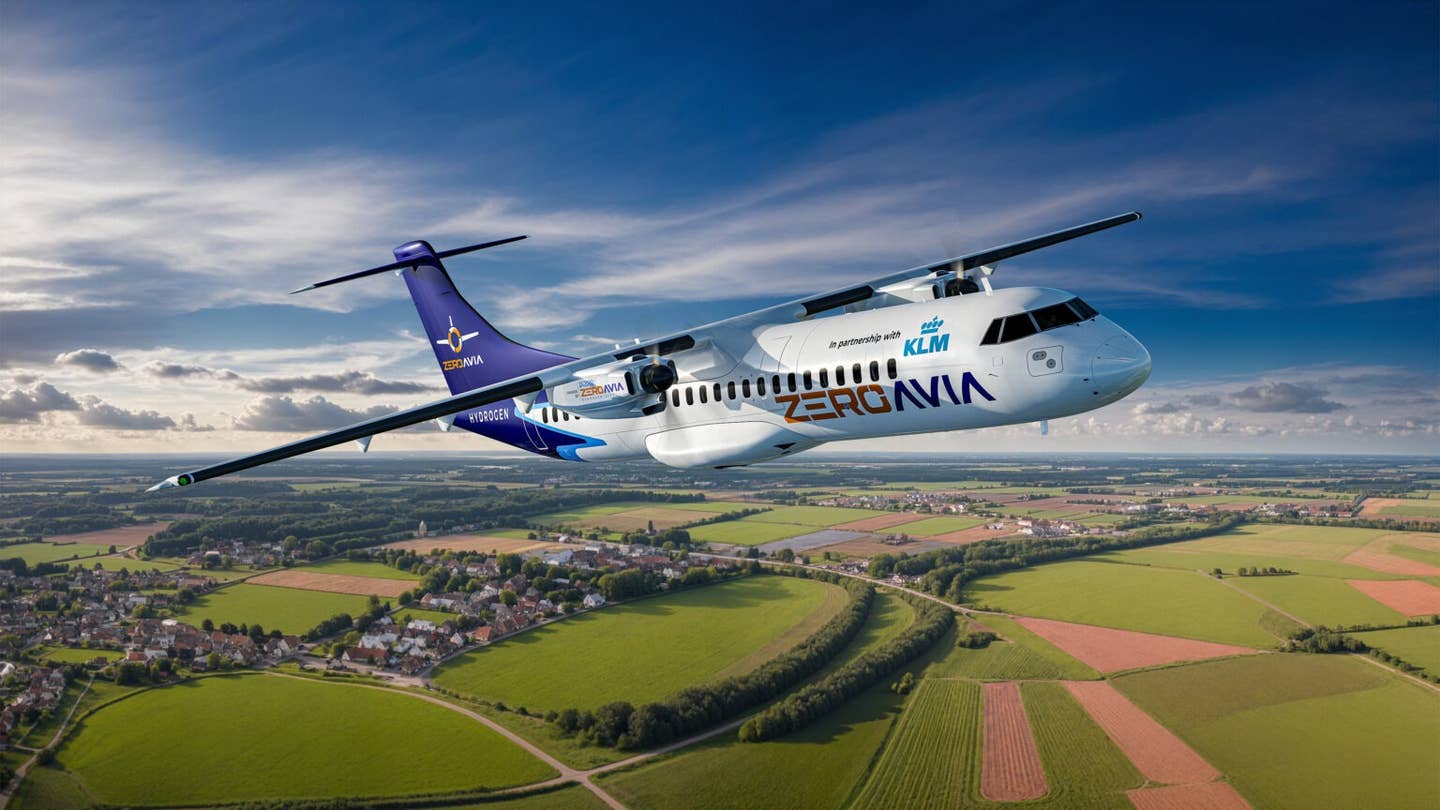ZeroAvia Completes $116 Million Series C to Support Hydrogen-Electric Engine Tech
The hydrogen-electric propulsion developer raised funds, including from the U.K. Infrastructure Bank, to support certification and scaling of its technology.

A Dornier 228 equipped with a prototype of ZeroAvia’s ZA600 hydrogen-electric engine conducts flight testing in 2023. [Courtesy: ZeroAvia]
When it comes to decarbonizing aviation, investors largely view hydrogen as a key ingredient in the quest for sustainable aviation, with some investing in companies developing fuel from hydrogen in its pure form.
ZeroAvia, a developer of hydrogen-electric propulsion systems, on Monday announced it completed a $116 million Series C funding round to support certification of its ZA600 engines and the scaling of its technology for larger aircraft.
The round was co-led by previously announced financiers Airbus, Barclays Sustainable Impact Capital, and NEOM Investment Fund, as well as the U.K. Infrastructure Bank (UKIB), which joined as a “cornerstone-level” investor. Bill Gates’ Breakthrough Energy Ventures, Amazon’s Climate Pledge Fund, Horizons Ventures, Alaska Airlines, and several others were named as participants.
“This is a great example of the bank supporting a first-of-a-kind technology that has real potential to have a telling impact on carbon emissions and help position the U.K. at the forefront of a developing green hydrogen ecosystem,” said Ian Brown, head of banking and investments at UKIB.
According to ZeroAvia, the bank’s financing will promote the company’s growth plans in the U.K., where it has been predicted that one-quarter of carbon emissions will come from aviation by 2050.
“ZeroAvia has grown rapidly in the U.K. as we have worked to deliver two major historic milestones in aerospace engineering, as we look to preserve the benefits of flight through clean propulsion,” said Val Miftakhov, founder and CEO of ZeroAvia. “This backing by such a preeminent investor as [UKIB] will help us deliver the first commercial zero-emission flights and help the U.K. realize substantial export potential.”
UKIB, meanwhile, has the opportunity to become a market leader in the country’s quest to eliminate aviation emissions by the 2050 timeframe. Founded in 2021, the bank’s mandate is to back emerging technologies and crowd in private investment while driving regional growth and taking on climate change. It said a successful rollout of hydrogen engines in aviation could catalyze the development of wider hydrogen infrastructure.
“Aviation and hydrogen are sectors that need significant private investment to get to net zero,” said Brown. “By providing confidence to investors, our equity has helped to crowd in the private investment needed for the continued development of this cutting-edge technology and should help stimulate the development and deployment of hydrogen technology across other hard-to-decarbonise sectors.”
ZeroAvia’s latest funding comes three years after a series A investment led by Breakthrough Energy, the Climate Pledge Fund, and other participants in November’s round netted it $21.4 million. It followed that up last year with a Series B from Barclays, Neom, International Airlines Group, and American Airlines, bringing its total raised to $150 million.
The company is starting small: Its ZA600 engine, a 600-kilowatt, hybrid-electric powertrain, will be retrofitted on regional turboprops with nine to 19 seats and a range of 300 sm (260 nm) by the end of 2025. Two years later, the ZA2000, a 2-5 megawatt model, is expected to support aircraft with 40 to 80 seats and a 700 sm (608 nm) range.
So far, ZeroAvia has secured experimental certificates to test its engines with the FAA and the U.K.’s Civil Aviation Authority (CAA) using three separate testbed aircraft.
The company has already hit several flight test milestones, most notably using a Dornier 228 equipped with one ZA600 engine and one conventional stock engine. Since completing its maiden voyage in January, the aircraft has gone through a range of tests, including flying at 5,000 feet, weathering a 23-minute endurance test, and operating in just-above-freezing temperatures.
ZeroAvia says it has a number of engineering partnerships with key aircraft OEMs, such as Cessna, Beechcraft, and de Havilland Canada. It claims to have nearly 2,000 preorders from major global airlines, including United Airlines, which in 2021 signed on as an investor and agreed to purchase up to 100 engines.
Simultaneously, the manufacturer is working on several projects. The most recent is a collaboration with Airbus to explore certification for hydrogen-powered systems. The partners also intend to examine liquid hydrogen fuel storage, fuel cell propulsion testing, and the development of hydrogen refueling infrastructure.
Another venture involves Textron, with which ZeroAvia will collaborate to install the ZA600 on a Cessna Grand Caravan turboprop. The company is also working with European airport operator AGS Airports to develop hydrogen fuel infrastructure and zero-emission routes, while a partnership with autonomous cargo aircraft developer Natilus will see it add its engines to the company’s Kona model.
Like this story? We think you'll also like the Future of FLYING newsletter sent every Thursday afternoon. Sign up now.

Subscribe to Our Newsletter
Get the latest FLYING stories delivered directly to your inbox






